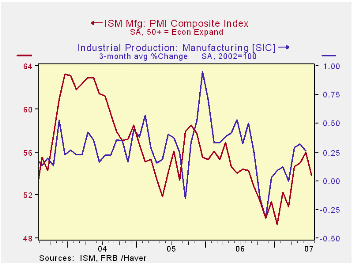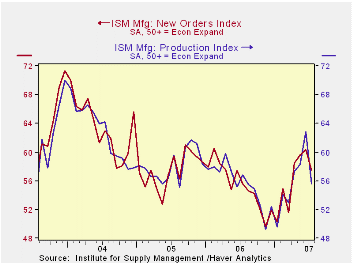 Global| Aug 01 2007
Global| Aug 01 2007ISM Index Down Sharply
by:Tom Moeller
|in:Economy in Brief
Summary
The Institute of Supply Management (ISM) reported that the Composite Index of activity in the manufacturing sector fell sharply to 53.8 from 56.0 during June. Consensus expectations for a lesser dip to 55.5 and the decline reversed [...]

The Institute of Supply Management (ISM) reported that the Composite Index of activity in the manufacturing sector fell sharply to 53.8 from 56.0 during June. Consensus expectations for a lesser dip to 55.5 and the decline reversed the moderate gains of the prior two months.
During the last twenty years there has been a 64% correlation between the level of the Composite Index and the three month growth in factory sector industrial production.

Three of the index's five components fell last month, but the decline in the production index was a notable 7.3 points to the lowest level since March. The employment index also fell for the third month in a row to the lowest level since March. During the last twenty years there has been a 67% correlation between the level of the ISM employment Index and the three month growth in factory sector employment.
The new orders index fell 2.8 points to the lowest since April. The inventory index rose 3.2 points to 48.5 and the supplier deliveries index rose in July to 52.0.
Prices fell three points to 65.0. This third consecutive monthly decline lowered the price index eight points below the recent peak in March. During the last twenty years there has been a 77% correlation between the price index and the three month change in the PPI for intermediate goods.
| ISM Manufacturing Survey | July | June | July '06 | 2006 | 2005 | 2004 |
|---|---|---|---|---|---|---|
| Composite Index | 53.8 | 56.0 | 54.4 | 53.9 | 55.5 | 60.5 |
| New Orders Index | 57.5 | 60.3 | 55.6 | 55.4 | 57.4 | 63.5 |
| Prices Paid Index (NSA) | 65.0 | 68.0 | 78.5 | 65.0 | 66.4 | 79.8 |
Tom Moeller
AuthorMore in Author Profile »Prior to joining Haver Analytics in 2000, Mr. Moeller worked as the Economist at Chancellor Capital Management from 1985 to 1999. There, he developed comprehensive economic forecasts and interpreted economic data for equity and fixed income portfolio managers. Also at Chancellor, Mr. Moeller worked as an equity analyst and was responsible for researching and rating companies in the economically sensitive automobile and housing industries for investment in Chancellor’s equity portfolio. Prior to joining Chancellor, Mr. Moeller was an Economist at Citibank from 1979 to 1984. He also analyzed pricing behavior in the metals industry for the Council on Wage and Price Stability in Washington, D.C. In 1999, Mr. Moeller received the award for most accurate forecast from the Forecasters' Club of New York. From 1990 to 1992 he was President of the New York Association for Business Economists. Mr. Moeller earned an M.B.A. in Finance from Fordham University, where he graduated in 1987. He holds a Bachelor of Arts in Economics from George Washington University.
More Economy in Brief
 Global| Feb 05 2026
Global| Feb 05 2026Charts of the Week: Balanced Policy, Resilient Data and AI Narratives
by:Andrew Cates






